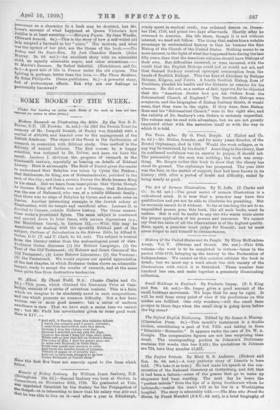SOME BOOKS OF THE WEEK.
I.Untisr this heading we notice such Books of the week us hew not been r tamed for Ylltd#1.0 in other forma.] Modern Research as lliustrating the Bible. By the Roy. S. R. Driver, D.D. (H. Frowde. 3s. net.)—In 1907 the Sweieb Trust (in Memory of Mr. Leopold Sweiell, of Paris) was founded with is capital of £10,000, and handed over to the management of the British Academy. The object of the Trust is the furtherance of research in connexion with Biblical study. One method is the delivery of annual lectures. The first course, by a happy selection, was assigned to Dr. Driver, and hero we have the result. Lecture I. sketches the progress of research in the runeteenth century, especially as bearing on details of Biblical history. Here is an example. The Book of Daniel gives the reader to understand that Babylon was taken by Cyrus the Persian ; that Belshazzar, its King, son of Nebuchadrezzar, perished in the sack of the city ; and that a certain Darius the Made became King in hits stead. But we learn from inscriptions that Cyrus, though be became King of Persia, was not a Persian ; that Belshazzar W3 the son of Nabonaid, who was of a totally different family ; that there was no siege of Babylon by Cyrus, and no such ruler as Darius. Another interesting example is the Jewish colony at lephantina, with its temple and sacrificial altar. Lecture II. is devoted to Canaan, outside Hebrew history. The Gezor excava- tions make a prominent figure. The same subject is continued and carried down to later times, with certain digressions (e.g., the Maccabean times), in Lecture III.--.With. this may be tientioned, as dealing with the specially Biblical part of the subject, Outlines of Introduction to the Hebrew Bible, by Alfred S. Goden, D.D. (T. and T. Clark, Ss. 6d. net). The subject is treated from the literary rather than the archaeological point of view. Professor Geden discusses (1) the Hebrew Language; (2) the Text of the Old Testament ; (3) Hebrew and Greek Canons of the Old Testament ; (.4) Later Hebrew Literature ; (5) the Versions ; (0) the Pentateuch. We would express our special appreciation of the last chapter, in which Professor Cloden shows an admirable temper, ready to accept the results of research, and at the same time quite free from destructive tendencies.






































 Previous page
Previous page